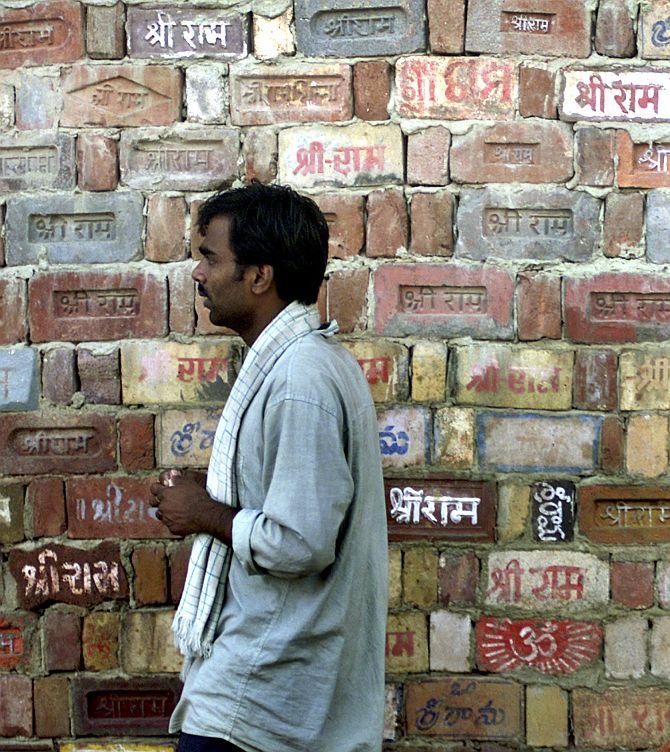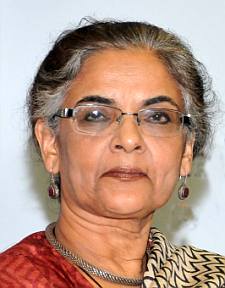'The ruling provides a Constitutional template, it draws boundaries, and there is this expectation that henceforth political parties will not make crude appeals to religion for electoral gains.'

Zoya Hasan -- Professor Emerita, Centre for Political Studies, Jawaharlal Nehru University and Distinguished Professor, Council for Social Development -- is one of India's most distinguished political scholars.
Professor Hasan, image, below, tells Rediff.com's Prasanna D Zore that the Supreme Court judgment deeming as 'corrupt practice' the use of religion, caste, language or creed for electoral gains will discomfit political parties from exploiting identity politics and the assembly elections in Uttar Pradesh will definitely test the effectiveness of this ruling.
Will the Supreme Court judgment on making illegal the use of appeals to religion, caste, language and creed to influence voters help clean the Augean stables of communalism and casteism in Indian politics?
The Supreme Court was basically grappling with the question of whether a provision in electoral law which bars candidate from canvassing for votes on the basis of religion, caste and other identities in an election is limited to the groups to which candidates or their rivals belong, or whether it is a general prohibition on sectarian appeals and should this attract disqualification.
The Supreme Court in a majority verdict (4:3) has ruled that any use of religion or any other communal or sectarian appeal in the electoral arena will be considered corrupt and will attract disqualification.
The Supreme Court judgement is significant because it is a 'purposive interpretation' that covers both candidates and voters.
It is also significant because it buttresses India's commitment to secularism which it regards as a basic feature of the Constitution.
However, implementing this judgment will be a major challenge because it is not easy to delink electoral politics from religion and caste, which have become extremely important from the early 1990s starting with the mobilisation campaigns during the Mandir and Mandal movements.
So, there is a great deal of uncertainty about the implementation of this verdict.
Isn't then there a loophole in this judgment? BJP MP Subramaniam Swamy has said the BJP will make use of Hindutva in elections.
Yes, there is a loophole.
The one big limitation with this judgment is that it has nothing to say on the substantive issue of how to characterise Hinduism or Hindutva within the broader context of electoral appeals.
It has basically ducked the issue. This allows the BJP and the Sangh Parivar to use Hindutva for political mobilisation in elections and not be called out for it.
This verdict did not revisit the famous or infamous Hindutva judgment of 1995 where the Supreme Court held that Hinduism and Hindutva amounted to a way of life, and therefore speeches that invoked these words did not amount to a corrupt electoral practice.
The Hindutva judgment has to be tackled. But given the sway of majoritarianism in Indian politics today, it is unlikely that this can be done at this moment.
However, it is extremely important to make a distinction between Hinduism and Hindutva. The latter is an ideology, a political platform, for mobilisation which makes use of Hinduism and gives primacy to Hindu interests.
Conflation of Hinduism and Hindutva and characterising Hindutva as a way of life allows majoritarian appeals to go scot free.
This was apparent in the 2014 Lok Sabha election campaign and in the Bihar campaign in 2015.
Important BJP leaders were continually making speeches, statements and innuendos and insinuations about the Muslim community to polarise the electorate and influence the voters.
The Election Commission was not able to put a stop to it.
Given this assertion, do you believe politicians who play the identity card to appeal to voters will be deterred by this judgment?

That remains to be seen. Even so, in the present circumstances and given the growing importance of Hindu nationalism and the wider social and political context in which religion and religious communities have come to dominate public discourse in India, this ruling can act as a check on the exploitation of religion for political mobilisation.
By religion, you would also mean caste, language?
I think these are two different issues. The language issue has not been so problematic, it is more or less settled; the critical issues are really religion and caste.
This ruling clearly states that communal and sectarian appeals should be taken off the table; they should be excluded from electoral politics.
The ruling provides a Constitutional template, it draws boundaries, and there is this expectation that henceforth political parties will not make crude appeals to religion for electoral gains.
But what happens to the parties such as the Shiv Sena, Akali Dal, AIMIM, whose very name evokes sectarian affiliation?
Does it mean that these parties cannot operate and participate in electoral politics? That remains to be seen.
The other big issue is caste. There are serious doubts with regard to its applicability to caste.
Caste and the politics surrounding it enjoy a certain degree of legitimacy and acceptability in government policy and electoral politics in India.
The same cannot be said about religion, especially with regard to minority religions or minority interests which are always treated with suspicion.
Electoral politics has in fact promoted caste and one could argue that it has played a positive role in mobilisation and empowerment of the marginalised communities.
So, how do you eliminate political mobilisation based on caste identity?
We also have representation in India's elected legislatures based on caste... we have seats reserved for the scheduled castes and scheduled tribes?
Scheduled Castes, Scheduled Tribes and Other Backward Classes are constitutional categories.
The Constitution allows reservations and range of affirmative action on the basis of caste, but it bars reservations on the basis of religion.
Can't then the same logic be used for mobilising people on the ground of religion?
Political parties who mobilise voters based on religion can pose a counter argument.
Let's for a moment keep aside the issue of caste which complicates the present debate. We should focus on the principal issue which is prohibiting sectarian appeal to religion.
If only this can work, then it would go a long way in reducing the role of religion in political mobilisation.
What dilutes it, or takes away its significance, is that it did not return to the Hindutva judgment of 1995.
But one could argue that the Supreme Court was not really called upon to do so; the Court was principally required to interpret Section 123 (3) of the Representation of People's Act.
That said, it appears the Supreme Court did not want to get into this territory.
As long as the Court doesn't re-examine the Hindutva judgment, the recent judgment would be in the nature of an exhortation to political parties to not use religious, casteist and linguistic identities for seeking votes.
Do you see any chance of the Supreme Court revisiting the 1995 Hindutva judgment?
I don't see the Supreme Court tackling it.
Let's face it: Hindu nationalism is presently a very powerful political, cultural force. It is entrenched in the political system. Therefore, it is unlikely the Hindutva judgment will be revisited anytime soon.
But I certainly hope that this judgment will in some ways discomfit political parties and constrain them from making communal appeals.
How do you see the Uttar Pradesh election campaign rolling out?
We have the BJP, the SP, the BSP, all willy-nilly use identity politics to win votes.
Will the judgment weaken the identity plank of these political forces in the UP elections?
The UP elections will be the first test of the effectiveness of this ruling.
A ruling such as this will only act like a framework requiring political parties not to use any caste or communal parameters to canvass for votes, regardless of whether the candidates themselves belong to such groups.
Ultimately, this framework has to be operationalised, which means the parties violating it should be penalised.
But who is going to do that is the basic question?
The Election Commission will have to take action, but it does not have sufficient power to disqualify candidates.
The Election Commission should be more proactive as it can now take stronger punitive action in the light of this judgment.
Complaints can also be filed in the court, but we know that route takes a long time to conclude.
In the light of this judgment, will the Ram Mandir be an issue in the UP elections?
The prime minister will talk about development while the other BJP leaders will be making direct and indirect appeal to religion to mobilise voters, including possibly on the Ram Mandir issue.
If the Election Commission decides to follow this judgment in the letter and spirit, then any reference to the Ram Mandir should be excluded from their election campaign and should attract debarment.
Do you think Prime Minister Narendra Modi will use the word Ram Mandir in his election speeches in UP?
The prime minister may not do so. But he has his own way of speaking where he brings these issues in oblique, elliptical ways.
So, he may not speak directly about Ram Mandir. And does he have to?
There are number of other BJP leaders who can do so. The point is that the 1995 Hindutva judgemnt provides space and gives latitude to the BJP to talk about Hindutva and as you said Subramaniam Swamy has already said so.
Notwithstanding the ruling, will there be crude appeals to identities in the UP elections?
I won't say there will be crude appeals, but yes identity politics is not going away anywhere.
It's a staple of Indian politics. It won't go away after this judgment.
Whether this will secularise politics or otherwise remains to be seen.
IMAGE: A scene from Ayodhya. Will the Ram Janambhoomi issue resurface during the UP election campaign? Photograph: Roy Madhur/Reuters










